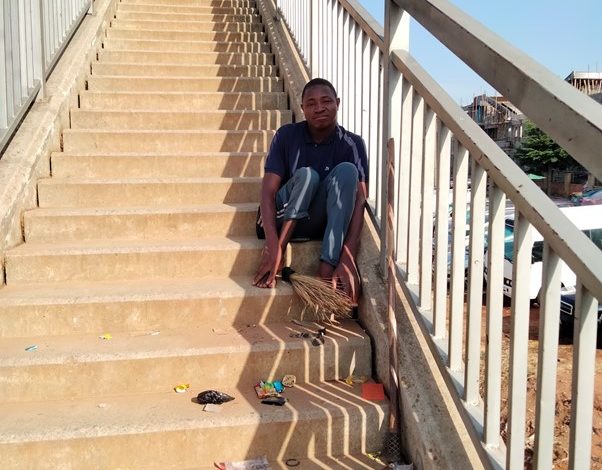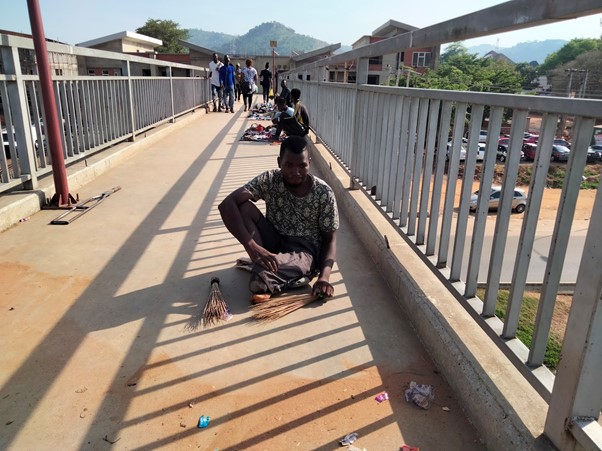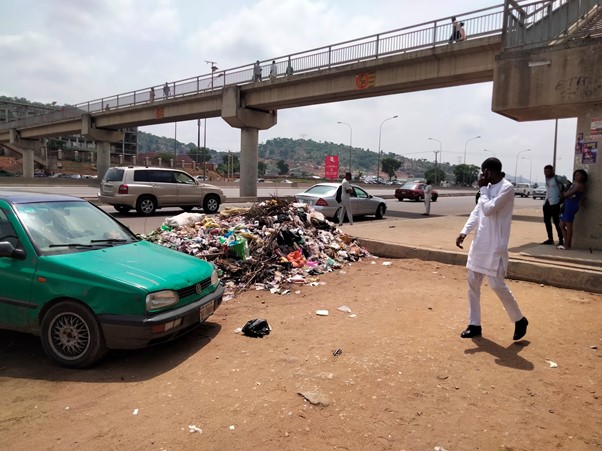
Five years ago, 32-year-old Abdullahi Abubakar left Bauchi, Northeast Nigeria for Abuja, Nigeria’s capital city in hopes of a better livelihood.
Abubakar lost his legs to polio as an infant. Despite this, he completed secondary school education, although he was unable to further his studies or find a job.
“I started begging, but I wasn’t making much, then my friend suggested I relocate to Abuja,” he told HumAngle.
Filled with the desire for a better life, he left his wife and three children in Bauchi and travelled to Abuja. Abubakar hoped he would be able to improve his family’s status. But after five years in Nigeria’s seat of power, he learned the hard way that life in Abuja was not as he thought it would be.
“So I started to sweep this bridge and people started helping me,” Abubakar continued.
Abubakar, who comes from a small village in Dawaki, said though what he gets from tips is not much, but “I have to support my wife who plaits hair in the village to support the family,” said.
A growing venture
Like Abubakar, Salisu Ali, and Sani Nura, both physically challenged, also sweep pedestrian bridges and court favours from passers-by.
Nura, 34, from Katsina State, is the first of five children. He lost a leg to an accident when he was much younger. He left home five years ago when his father got sick and life took a bad turn.
Today, Nura comes to the Gwarimpa pedestrian bridge by 6:30 a.m. every day from Deidei, a suburb in the city. There, he once sold phone accessories but now depends solely on getting tips for sweeping.
“I couldn’t continue my business after my father died, leaving my 76-year-old mother, stepmother, and four of her children,” Nura explained.
Ali, also a native of Katsina State, is married to a woman also disabled by polio. Currently, they have two daughters. He told HumAngle that he left his hometown six years ago for Dakwa, Niger State, where he raised some money to start a business through begging.

Shortly after, due to low returns, Ali started sweeping the Dawaki pedestrian bridge in 2019 where he tried to raise some money for his business. Unfortunately, the COVID-19 pandemic ruined that particular plan.
“I invested N20,000 in the business,” Ali said. “I was selling polish, cotton buds, key holders and several other things. But this time I don’t have money.”
Ali added that “I was selling something on that Gwarinpa bridge, then COVID-19 came and I went home to Katsina and the money finished because that period was tough. There was no help. We were just at home, and just like me, my wife doesn’t have legs.”

An honourable job
For Abubakar, who sweeps the Kubwa expressway instead of begging, sweeping is his job and he cannot afford not to show up at his place of work.
“For some people, they just come here to make money, but for me it’s like my government job. I take it seriously,” he said.
Abubakar comes to his location by 6 a.m. and goes home by 11 a.m. everyday with N2000 or less in his pocket. From what he makes, he saves for his son’s school fees.
“Sometimes I go home with N1,200, and I will have to send money home to my wife and children. I send like N800 to them, save N200 and live on the remaining till the next day. But on good days I go home with N2000, and after dividing it I save N500.”
Caught by the AEPB, advocated for by passers by
“I have been caught twice and taken to Bwari. I stayed there for six days. Before I married my wife, she was caught and taken to either Area 3 or Bwari more than 13 times,” Ali described their experience with the Abuja Environmental Protection Board (AEPB).
But the reverse is the case for Abubakar and Nura.
“I have never been caught. Though they disturb me, when they come they say, stand up and go, and I will just tell them that I am sweeping, not begging. People sometimes start shouting at them to leave me alone and say I am doing a good thing,”Abubakar told HumAngle.
Nura, on the other hand, said he is smart and observant enough to vacate the premises when he sees AEPB team coming towards his direction.

Fulfilled or not?
Nura is able to support his younger siblings to attend both an Islamic school and also have a formal education. Abubakar, on the other hand, hopes to be able to send all his children to school and also get a ‘proper job.’
“It’s only my first son that goes to school, the girls don’t,” Abubakar said. “I wish I could get more help so all of them could go to a very good school, but I will keep working hard.”
Ali’s case is similar. His two daughters do not go to school because he cannot afford it. Currently, what he and his wife make together from sweeping is barely enough to feed their family.
“My wife doesn’t make much. Sometimes I only have N500 after paying for transportation, and it’s not even enough for food,” Ali told HumAngle.
Abubarkar, Ali, and Nura are just a few of the many physically challenged persons whose lives depend on alms from sweeping pedestrian bridges across cities in Nigeria.
Support Our Journalism
There are millions of ordinary people affected by conflict in Africa whose stories are missing in the mainstream media. HumAngle is determined to tell those challenging and under-reported stories, hoping that the people impacted by these conflicts will find the safety and security they deserve.
To ensure that we continue to provide public service coverage, we have a small favour to ask you. We want you to be part of our journalistic endeavour by contributing a token to us.
Your donation will further promote a robust, free, and independent media.
Donate HereStay Closer To The Stories That Matter




